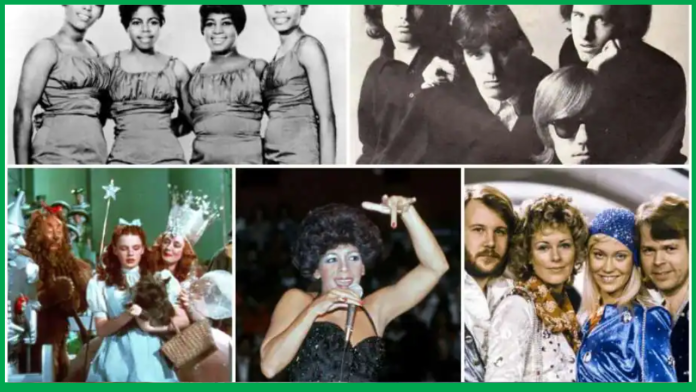In the past, a song ban meant missing gigs, losing sponsorships, and damaging reputations. Today, however, being banned can sometimes propel a band into the spotlight. Since the birth of rock ‘n’ roll, songs have been censored or banned for various reasons. Let’s explore why some famous tunes became the “black sheep” of the music industry.
“Imagine” by John Lennon & The Plastic Ono Band
John Lennon’s anthem for peace was considered blasphemous and anti-American, particularly with its lyrics about no religion or countries. Banned during the Gulf War and after 9/11, “Imagine” was deemed too contentious for events like graduations and funerals, despite its universal message.
“Strange Fruit” by Billie Holiday
This haunting song about lynching and racism was banned by radio stations upon its release in 1939. It was so controversial that it even put Billie Holiday at odds with her record label. The song later became one of the most iconic protest songs ever.
“Take the Power Back” by Rage Against the Machine
Known for their defiant lyrics, Rage Against the Machine was frequently censored. Their controversial performance on Saturday Night Live in 1996, along with local school bans, highlighted the band’s clash with authority.
“Like a Prayer” by Madonna
Madonna’s 1989 hit caused an uproar for its religious imagery, leading to Pepsi pulling an ad featuring her. The Vatican condemned the video, and the pop star’s provocation became one of the most talked-about moments of her career.
“God Only Knows” by The Beach Boys
The Beach Boys’ 1966 love ballad was banned in some Southern U.S. radio stations for its perceived blasphemy due to the inclusion of “God” in the title. This, despite the song’s gentle theme of love.
“Splish Splash” by Bobby Darin
In 1958, some radio stations censored Bobby Darin’s hit for implying sexual innuendo, especially with the playful lyrics about partying in a towel. Despite this, the song became a chart-topping success.
“Royals” by Lorde
In 2014, some radio stations banned Lorde’s “Royals” from their playlists, simply because it became an anthem for Kansas City Royals fans during the World Series. This bizarre ban was due to its association with the team.
“In the Air Tonight” by Phil Collins
This iconic 1981 track was banned during the Gulf War and after 9/11 for its eerie lyrics, with some interpreting it as a veiled commentary on the conflicts. The song’s haunting tone didn’t sit well with broadcasters during sensitive times.
“Wake Up Little Susie” by The Everly Brothers
Banned in Boston in 1957 due to concerns about implied teenage intimacy, this song about a couple staying out late became a huge hit despite the censorship.
“Will You Still Love Me Tomorrow” by The Shirelles
This 1960 hit was banned by some U.S. radio stations because it hinted at a woman’s vulnerability before a first sexual experience, a concept too suggestive for the time.
“I Saw Mommy Kissing Santa Claus” by Jimmy Boyd
The 1952 Christmas classic sparked outrage from the Catholic Church for its “sensual” undertones and was banned by several radio stations during the holiday season.
“Louie Louie” by The Kingsmen
The FBI investigated this 1963 hit after a concerned parent sent a letter to Attorney General Robert Kennedy, alleging obscene lyrics. Despite the investigation, no conclusive evidence of explicit content was found.
“If U Seek Amy” by Britney Spears
This 2008 song was banned for its suggestive wordplay, where “If U Seek Amy” sounded like a crude phrase. Critics quickly caught on to the innuendo in the chorus.
“(I Can’t Get No) Satisfaction” by The Rolling Stones
The Rolling Stones’ 1965 hit was banned in the UK for its controversial lyrics about consumerism and rebellion, but it still soared to the top of the charts.
“Rolling in the Deep” by Adele
Adele’s massive 2011 hit was censored by some radio stations due to concerns over the phrase “I’ll lay your sh*t bare,” which they misinterpreted as offensive. Despite this, it topped charts worldwide.
“The Real Slim Shady” by Eminem
Eminem’s controversial 2000 song was fined by the FCC after complaints about its explicit content. The song was censored for its provocative lyrics, which led to a fine for a Colorado Springs radio station.
“Cop Killer” by Body Count
Ice-T’s 1992 track faced backlash for its anti-police message. Although the song was removed from the album after criticism, it became a flashpoint in the debate over free speech in music.
“Light My Fire” by The Doors
The Doors were banned from The Ed Sullivan Show in 1967 for refusing to change the word “higher,” which was deemed a reference to drugs. The band’s defiant performance only fueled their rebellious reputation.
“Juicy” by The Notorious B.I.G.
Though the song predated the 9/11 attacks, the line “Blow up like the World Trade” led to it being banned post-9/11 due to its eerie coincidence with the tragedy.
“Lola” by The Kinks
The Kinks’ 1970 hit was censored by the BBC for mentioning a brand name in the line “cherry cola.” The band had to record a new version to comply with the BBC’s rules on product placement.
Each of these songs pushed boundaries, and their bans only helped solidify their place in music history. Whether it was due to provocative lyrics, controversial themes, or misunderstood metaphors, these tunes were deemed too controversial for their time—only to become iconic in their own right.
By CarNovels


